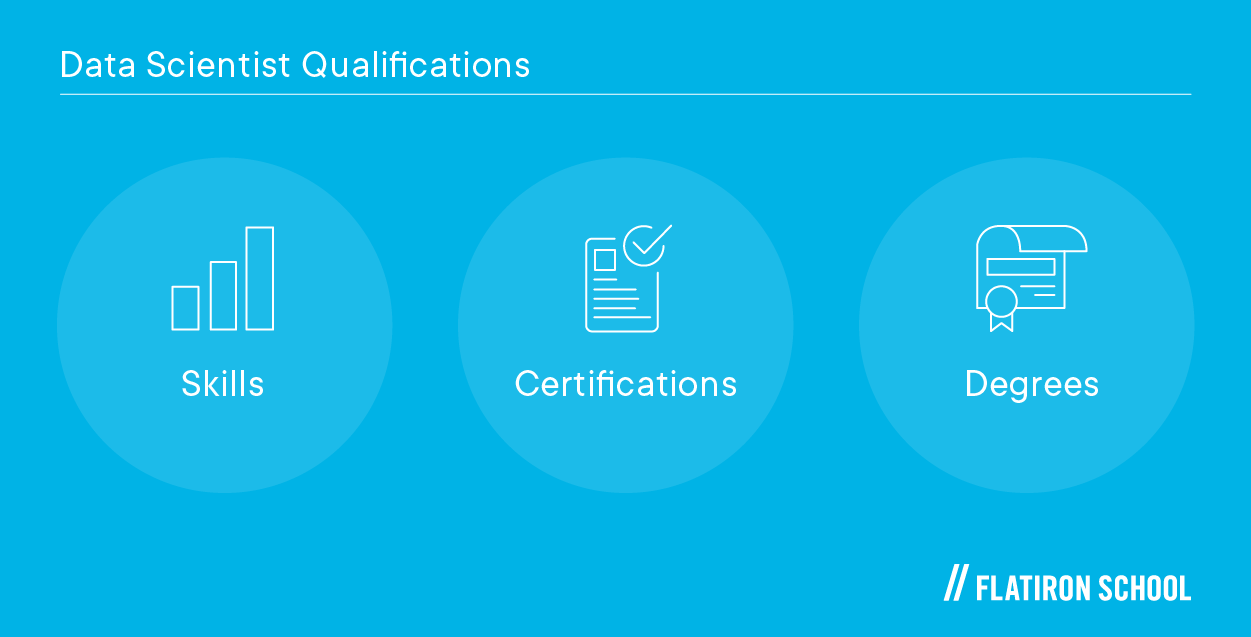Data science is becoming increasingly important for organizations worldwide, whether for-profit, governmental, or otherwise. And as the importance of data science and data analytics increases, so does the demand for people for data scientist jobs.
Fortunately, there are a lot of ways to become a data scientist — from teaching yourself, to a college degree, to a data science bootcamp. Below, we map out how to become a data scientist.
What is a data scientist?
A data scientist is someone who manipulates and interprets data to develop a business’s overall goals. Data scientists work in big data, machine learning, natural language processing, data visualization, or AI roles within companies of all sizes, and often on teams with data engineers, business intelligence specialists, and data architects.
Data scientists use programming languages and databases to develop models that extract predictions in large datasets, produce recommendations, and test for statistical significance. They often work on high profile projects and interact with upper management to develop these initiatives. Some examples of data science projects are Netflix, Amazon, and Spotify recommendations, credit card fraud alerts, and stock price predictions.
How do you become a data scientist?
Data scientists use a combination of statistics, programming, and math to explore and develop models which uncover opportunities or solve problems, so having a working understanding of these areas is critical.
An undergraduate degree in Business, Management, Marketing, Statistics, Mathematics, Economics, or Applied Mathematics will develop a strong foundation in parts of these areas. But you can also get certifications and continuing education courses to fill in gaps in other areas.
Of all these areas, statistics will be the most important. Programming, models, and math are all areas that can be developed around an in-depth knowledge of statistics.
In most roles, knowledge of the industry or relevant subject matter will also be required. This is where degrees in other areas can become useful, like biology, medicine, law, marketing, real estate, banking, and more.
Most data scientists will also have to present their work or findings at some point, so the ability to collaborate – especially with non-technical stakeholders- is critical to developing a successful career. Creating presentations or visualizations of analyses at each point of a project and explaining the statistical significance of your findings will also be key.
If you’re willing to spend time going deep in many challenging technical areas to develop the context to address complex problems, data science could be for you. Regardless of your background, you can gain the knowledge and skills to be a part of the future of data, and earn a big data scientist salary.
What is the difference between a data scientist and a data analyst?

Data analysts and scientists operate in completely different ways. While the skills of an analyst can be used in a data science role, they will interface with different business partners, have different daily tasks, and draw different salaries.
Data analysts work and organize existing data in search of patterns and discrepancies, while data scientists use complex models to predict the future. Data analysis is a business function that has existed for a long time, while data scientists are a relatively newer role due mostly to the recent growth of big data and cloud technology.
Data analysts operate like detectives, while data scientists test and build models like an architect. Because of the highly technical nature of required data science skills, these roles are much rarer and can command much higher salaries than data analyst roles.
Learn more about the differences between data analysts and data scientists.
Data scientist qualifications

Skills
A data scientist must be a balanced professional. While deep technical expertise is required, collaborating with non-technical management and stakeholders is critical. Presenting, visualizing progress and findings, alongside explanations of why and how statistics are used will all be a regular part of working as a data scientist.
Otherwise, basic data science programming skills include: Python, R, and SQL. Knowledge of cloud technology, Hadoop/Spark, and machine learning algorithms will also be critical.
Certifications
Certifications can demonstrate knowledge of technical areas and tools which change rapidly. Especially areas like cloud technology, which is constantly developing, certifications are a way to learn and demonstrate understanding of a company’s technology choices.
Key tools like Tableau and Hadoop also provide certification options to demonstrate proficiency in specific tools required.
Certifications can also demonstrate well-rounded skill sets. These certifications from SAS and the Data Science Council of America are both challenging and require knowledge of all areas of current data science roles:
- Certified data scientist: This certification from SAS indicates that data scientists know how to use SAS technology to manipulate big data.
- Senior or Principal data scientist: This certification from the Data Science Council of America proves that candidates have extensive experience with analytics and data engineering. The senior certification requires six years of professional experience and a 100-minute exam, while the principal credential requires 10 years of experience and a 100-minute exam.
Degrees
There are now a plethora of data science graduate programs which will prepare you for the current state of data science roles. PhD graduates are also favorites for companies because of the heavy research nature of these programs.
However, before you rush back to school, know that you can find a data science job with a strong undergraduate degree and skill development in missing areas of knowledge. A degree in a STEM field, business, or economics are all great options to prepare a strong foundation for data science skills.
Can you become a data scientist without a degree?
While many job descriptions require education as advanced as a PhD, many companies are happy to hire skilled professionals – without advanced degrees – who can get the job done. Data science is a rapidly growing field with a deficit of skilled professionals.
Bootcamp programs like Flatiron School have had success in training both technical and non-technical participants to find careers in data science.
Learn more about becoming a data scientist without a degree.
Your two best paths to becoming a data scientists

College and bootcamps are great options to break into data science. Both provide clear paths to a career and take the guesswork out of which topics to prioritize. There are pros and cons to each path.
Going to college
The cost and time required to complete an additional degree to pursue data science may still be worth it today. With more options for both undergraduate and graduate programs specifically focused on data science skills, you can graduate with instruction from top notch professors, and a stamp of approval from a stellar university.
However, as with all technology, the pace of change can be faster than universities are able to accommodate. Hiring and developing curriculum which reflects the challenges of businesses today is much easier for leaner organizations like bootcamps.
You can’t go wrong with a bachelor’s degree or master’s degree in:
- Statistics
- Mathematics
- Economics
- Applied Mathematics
- Computer Science
Some of the current best graduate programs for data science are:
- Harvard
- Columbia
- University of Pennsylvania
- Duke University
- Johns Hopkins University
- Northwestern University
- University of Notre Dame
- Brown University
- Vanderbilt University
Going to a data science bootcamp
A data science bootcamp can be a much more accessible option for those wanting to get their start within a year. Bootcamps cover key material for on-the-job training and usually include mentorship from professionals who have or currently work in the field. Many also offer career services to help you find and land a job after you graduate.
Most bootcamps will require capstone projects to demonstrate skills, and include realistic interview experiences to prepare you to enter the real world of work as soon as possible.
However, due to the short-term nature of these programs, bootcamps are rigorous and intensive. Many of the best bootcamps are full-time, so holding a job during them isn’t really possible.
Also, though relatively inexpensive when compared to a graduate degree, bootcamps can be pricey. Full-time courses can range anywhere from $5,000–$20,000. Compared to a college degree that’s relatively inexpensive, but is a decent sum. Fortunately, almost all data science bootcamps offer loan programs or flexible payment options.
Flatiron School offers our immersive Data Science bootcamp both in-person and online, full-time and part-time, to meet your learning style, lifestyle, and schedule.
Making a decision
If making predictions, automating decisions, and identifying recommendations with data analytics sounds exciting to you, don’t let any educational background stop you! Everything it takes to become a data scientist is accessible, and a successful career is within your reach.
Regardless of the path you take, learning data science won’t be easy – it’s a field that changes so rapidly that you’ll be learning long after you complete your education. If that thought excites you, the field of data science is looking for ambitious professionals like you!
To see if data science is right for you, test the waters with our data science resources and lessons or you can learn Python for free.




